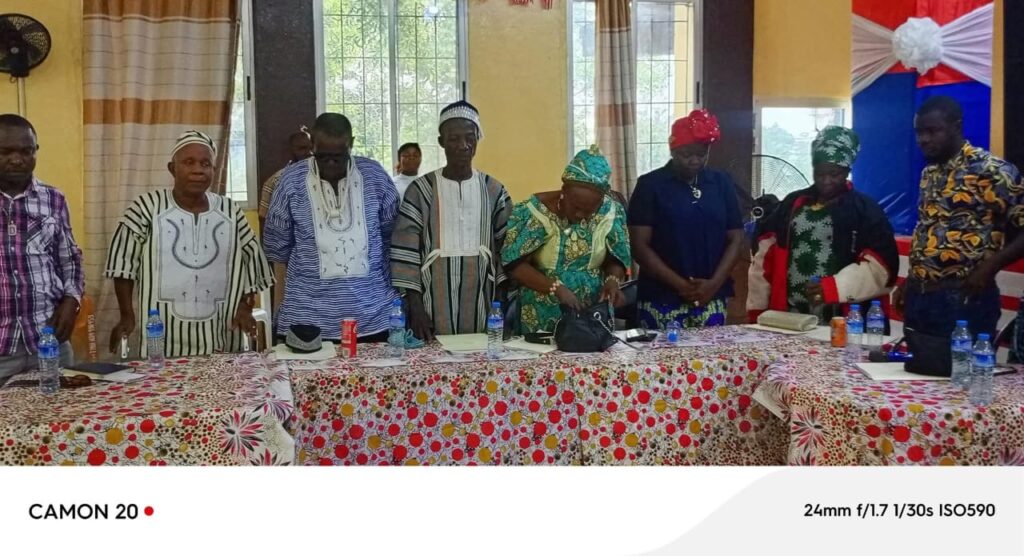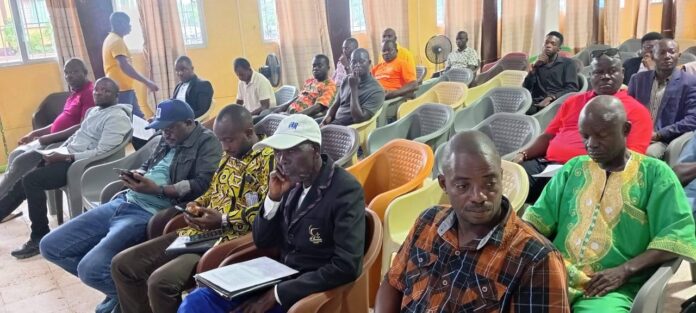Local Leaders Focus on Development, Governance, and Community Inclusion
Bong County’s local leadership has resumed its third quarterly County Council Session in Gbarnga, despite earlier delays caused by national legislative engagements. The two-day session, which began on July 23 at the Gbarnga Administration Building, brings together council members, administrative officials, and district representatives from across the county to assess development priorities and address urgent governance matters.
The session marks the first official council meeting of the year, after the first two quarterly gatherings were postponed. Participants include County Administrative Officer Mr. Sam Bayogar Elliott, Acting Superintendent Mr. Sam B. Elliott, and a range of stakeholders representing youth, women, civil society, religious leaders, and market associations.
Focus on Development and Accountability
Chairing the meeting is Mr. Aaron Sackie Fenlah, the County Council Chairperson, who opened the session by acknowledging the delays while reaffirming the council’s commitment to addressing the county’s development agenda.
“Although we are convening later than expected, we remain determined to use this opportunity to reassess our priorities, improve our governance strategies, and ensure that development continues across the county,” Fenlah told attendees.
He disclosed that the recent postponement of the council’s meetings was due to his appearance before the Senate to provide input on a proposed repeal of the Local Governance Act — a development that has sparked concerns among local officials about the potential erosion of county autonomy.
Fenlah warned that repealing the Act could weaken local decision-making and lead to the mismanagement of county development funds by central authorities or legislators.
“We must protect the integrity of local governance. Any attempt to repeal this law without proper public consultation could undermine the progress we’ve made toward community-driven development,” he added.
Reviewing Progress and Projects
The session’s agenda includes comprehensive reviews of ongoing development projects, budget performance, and infrastructure initiatives. Key reports were delivered on the first day by County Administrator Mr. Sam Bayogar Elliott and County Development Officer Mr. Sidike Kromah, who detailed updates on major county projects — including road rehabilitation, school renovations, and the construction of health facilities.

These reports help inform budget decisions and provide the council with an opportunity to track project implementation and identify bottlenecks. Many of these projects are being funded through County Social Development Funds (CSDF), which require transparency and monitoring to ensure public benefit.
Council members stressed the importance of timely disbursement of funds and stricter oversight mechanisms to prevent delays and cost overruns. With the rainy season in full swing, infrastructure and road access were top concerns, particularly for rural districts that remain cut off during heavy downpours.
Strengthening Community Participation
A major theme throughout the session was the need for greater community involvement in identifying and executing development priorities. Mr. Fenlah specifically called on community-based organizations, youth leaders, women’s groups, marketers, motorcyclists, and religious figures to take a more active role in governance and project planning.
“This council must not operate in isolation,” he declared. “Our people know their needs better than anyone else, and their voices must shape how we allocate resources.”
This emphasis on participatory governance aligns with Liberia’s decentralization efforts, aimed at ensuring that rural and marginalized communities have a say in how development is planned and delivered at the county level.
Civil society actors present at the session echoed Fenlah’s call, urging for greater transparency in the selection of contractors and monitoring of projects.
A Pivotal Time for Local Governance
The Gbarnga session comes at a critical time when the future of local governance in Liberia is under national scrutiny. The Local Government Act of 2018, which outlines the legal framework for decentralization, is being debated in the Senate. Local leaders worry that its potential repeal or amendment could reverse years of advocacy and development gains made through county councils and district platforms.
Council participants resolved to draft a formal position statement at the end of the session, expressing their stance on the legislation and proposing pathways for stronger collaboration between national and local governments.
The session concludes on July 24, with a final set of recommendations expected to shape the county’s development trajectory for the remainder of the year. Stakeholders remain hopeful that despite the late start, the outcomes will spark renewed energy and coordination in implementing county projects.
For Bong County, this meeting is not just administrative—it is a test of local leadership’s capacity to adapt, advocate, and act in the best interest of its people amid complex political dynamics.



